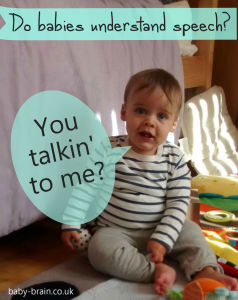I saw this interesting research paper today (1) about whether babies as young as 6 months understand that speech is used to communicate information (rather than random, interesting sounds that come out of our mouths).
→ Babies at 6 months appear to understand that speech transfers information between people
Some people might think – but of course! Others might think, wow, that’s early to understand such a thing.
The study also mentioned that:
- Previous research (2, 3) has shown that 12 month old children can understand that speech transfers information, even when the speech is unknown or a new experience for them.
- By 6 months, babies prefer speech over other sounds (4)
- They also associate speech as coming from people, rather than other animals, for example (5)
What the experiment did:
The researchers looked at:
- Whether 6 month olds could recognise that speech can communicate something about an object.
- In the experiment the baby watched an actor reach for one of two different objects. There was also a second person present. Next, the actor could no longer reach the objects, but the second person could
- so they either “spoke” to the person (they actually spoke a nonsense word, not a real conversation)
- or made a non-speech communication (a cough).
- The second person would then pick up one of the objects (there was a “target” object and a “non-preferred” object)
- The results showed that babies looked at the actor for longer when they reached for the non-preferred object than the target object when they made the nonsense word, but not when when they coughed.
The study concludes that at 6 months, even though babies have a very small receptive vocabulary, infants have some abstract understanding of the communicative function of speech. This understanding may help with their development of language and knowledge.
Conclusion
Six-month olds infer that a vocalization that takes the
form of speech, even without any previously established
meaning, can communicate information about an object…….
…… even before knowing many words, infants can already use their understanding of the abstract role of speech in communication to evaluate the outcome of communicative interactions. (pg7)
The main points:
-
babies understand that speech is used to communicate and has a communicative function before they build their vocabularies and start to speak.
-
understanding that speech is used to communicate may happen before the child develops language, and this understanding may also provide a mechanism for early language acquisition:
-
Babies start to learn quite early on that speech transfers information and may use this abstract understanding to learn about the meaning of individual words (6)
interesting!
References:
-
Vouloumanos, A., Martin, A., & Onishi, K. H. (2014). Do 6-month-olds understand that speech can communicate? Developmental Science, pp 1–8
-
Martin, A., Onishi, K.H., & Vouloumanos, A. (2012). Understanding the abstract role of speech in communication at 12 months. Cognition, 123 (1), 50 – 60.
-
Vouloumanos, A., Onishi, K .H., & Pogue, A. (2012). Twelve-month-old infants recognize that speech can communicate unobservable intentions. Proceedings of the National Academy of Sciences of the United States of America , 109 (32),12933 – 12937.
-
Vouloumanos, A., & Werker, J.F. (2004). Tuned to the signal:the privileged status of speech for young infants. Develop-mental Science. 7 (3), 270-276
-
Vouloumanos, A., Druhen, M. J., Hauser, M.D., & Huizink, A.T. (2009). Five-month-old infants’ identification of thesources of vocalizations. Proceedings of the National Acad-emy of Sciences of the United States of America,106 (44),18867-18872.
-
Waxman, S.R., & Leddon, E.M. (2002). Early word learning and conceptual development: everything had a name, and each name gave birth to a new thought. In U. Goswami(Ed.),The Wiley-Blackwell handbook of childhood cognitivedevelopment (pp. 102-126). Malden, MA: Wiley-Blackwell

